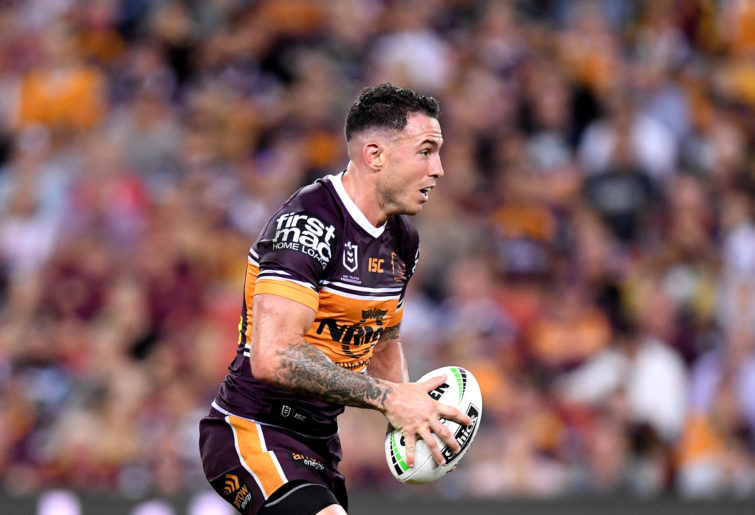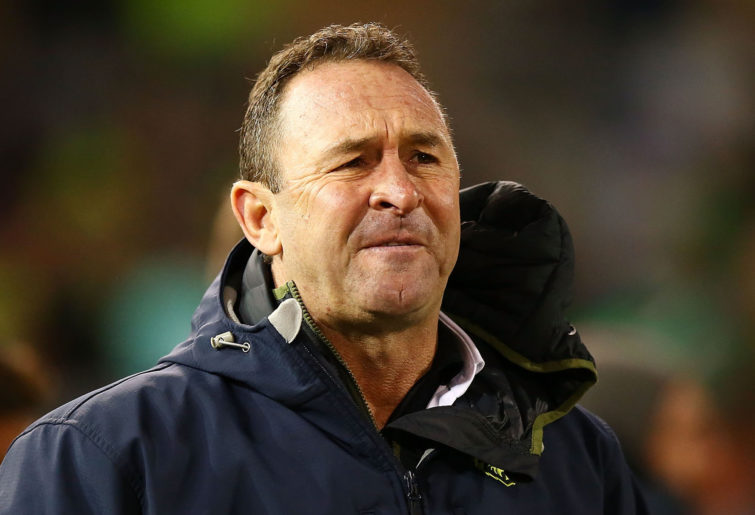WATCH: 'Stopped him cold!' RTS sits down Titans second-rower after textbook hospital pass
Roger Tuivasa-Sheck earnt plenty of cheers from the home fans after this big shot on Gold Coast's Klese Haas in the first half.
Opinion
In case you hadn’t noticed, there’s a federal election coming up. As a wise man once said, “It is important to bear in mind that political campaigns are designed by the same people who sell toothpaste and cars”.
If you need a distraction from our dismal politicians, here’s a selection of rugby league players who were born to lead.
None of them have been elected to the pantheon of immortals, though. They must have been undermined by treacherous squad players and faceless administrators.
Their power derives from the meaning of their given and/or family names, with some authoritative nicknames making up the bench.
1. Rich and kingly: Darius Boyd, Brisbane, St George Illawarra and Newcastle
Boyd was king of fullbacks in 2010 when he won the Dally M and International Federation fullback of the year awards, the Players’ Champion award and the Clive Churchill Medal. He was brilliant, but even Dragons’ supporters raised eyebrows at the latter honour.
He continued to be richly remunerated even as his kingdom crumbled. I understand Brisbane supporters still have nightmares about his left-edge defensive combination with David Fifita in 2020.

(Photo by Bradley Kanaris/Getty Images)
2. Always ruler: Eric Grothe Sr, Parramatta and Leeds
There were times during the early and mid-1980s when Eric Grothe seemed unstoppable. But in 1986 and the last throes of Parramatta’s dynasty, Grothe looked knackered.
But the ‘Guru’ abided, with his son Eric Grothe Jr playing for NSW and Australia, and for Parramatta in the 2009 grand final. There could be more to come.
3. The Taoiseach: Mat Toshack, Norths, South Queensland and London
Toshack was a good player on teams who mostly struggled, and he didn’t get many opportunities to exercise his constitutional powers in significant games.
In 1999, he was part of the London Broncos’ heavy Challenge Cup final defeat to Leeds, a team which featured Ireland internationals Francis Cummins, Ryan Sheridan, Barrie McDermott, Marcus St Hilaire and Jamie Mathiou. It was a coup.
4. Power ruler: Harry Bloomfield, Cumberland and Wests
Bloomfield will forever be top of the Cumberland power rankings as the club’s leading point scorer and only representative player.
He also has the unfortunate distinction of having played for arguably to the two worst top-flight rugby league teams Australia’s seen: Cumberland in 1908 and Wests in 1909. Between them, the two teams won three of 18 games and scored just 4.9 points per game.
5. Victor of the crown: Steve Gearin, Canterbury, St George and Manly
Gearin won the crown in glorious fashion, with a spectacular try late in the 1980 grand final clinching Canterbury’s 18-4 victory over Easts. He scored 14 of the Bulldogs’ points that day.
6. Peaceful ruler: Fritz Thiering, Glebe
In peacetime, Thiering played a key role in leading Glebe to a minor premiership in 1911 and victory in the 1913 City Cup final. Unfortunately, the peace didn’t last and Thiering’s career was cut short by the war.
As Max Solling wrote, Thiering was a “short, muscular coal lumper and outstanding athlete, a lifesaver with the Freshwater club and a main event professional lightweight boxer, nicknamed ‘Flinga’, who enlisted in 1916 and became lightweight champion of the 13th battalion.”
“In 1920, Thiering received his honour cap for 50 games, but the effect of mustard gas in France during the war left its mark, forcing his retirement”.
7. Strong in rule: Ricky Stuart, Canberra and Canterbury
The problem with ‘strong leaders’, or autocrats, is usually their isolation, paranoia and, eventually, madness.
This was Stuart last year after a defeat to the Warriors, “I came here because it’s my job, I respect the fact you’ve got a job and I have got $20,000 hanging over my head”.
“If I don’t turn up here tonight, I get fined. If all of the fine money was going to the Ricky Stuart Foundation, I would tell you the truth today because then the money is going to best cause I know of”.
“But I can’t tell you the truth, I can’t tell you the way that game panned out because I would get fined so I’m not going to answer any questions, I’ve done my job”.

Ricky Stuart (Photo by Mark Nolan/Getty Images)
8. Woman of high rank: Sarah Togatuki, Sydney Roosters
Togatuki was the best on ground and deserving winner of the Karyn Murphy medal in Sunday’s NRLW grand final. Her ferocious defence and relentlessly strong carries relegated the Dragons’ powerful props, Kezzie Apps and Elsie Albert, to second best.
9. House ruler: Frank Facer, Norths and St George
Is there a better example of nominative determinism than Facer? He was a handy hooker for Norths and St George during his playing days but found his calling as Secretary of the house of the Dragons from 1956 to 1978.
Ian Heads described him as a “rough diamond” and “the man who set the pace – emerging from any reasoned study of the St George phenomenon of 1956-66 as the heartbeat of the operation – and as valuable to Saints as any of the champion players who gathered at Kogarah during that period”.
10. Man of peace and togetherness: David Solomona, Easts, Parramatta, Wakefield, Bradford and Warrington
And now for something completely different, a man named after two biblical kings.
While Solomona may have united his teammates, he mostly failed to slay giants, losing two NRL grand finals and several Super League finals matches. His giant killing moment came in New Zealand’s 24-0 victory over Australia in the 2005 Tri-Nations final.
11. The King: Vince Karalius, St Helens and Widnes
Karalius was one of England’s greatest and most terrifying forwards. He was part of Great Britain’s 1958 Ashes series victory in Australia and was dubbed the ‘wild bull of the Pampas’ by the Australian press.
According to Eddie Waring, one Australian writer described him as, “the St Helens boiler-maker with classical taste in music who could stiff arm to the lilt of Il Trovatore”.
12. Deliverance: Josh Jackson, Canterbury
This is getting very biblical (sorry). Jackson may not be the second coming, but the hard-working back rower is worth his weight in silver pieces to Canterbury.
Two Test matches, nine State of Origins, two Dally M second rower of the year awards and a Provan-Summons medal reflect what he’s delivered over ten seasons for the Bulldogs.
13. Exalted: Jeremy Smith, Melbourne, St George Illawarra, Cronulla and Newcastle
Smith lifted every team he played for, winning a World Cup and a Four Nations title with New Zealand, a grand final with Melbourne and a premiership with St George Illawarra.
This Dragons supporter considers him the best signing the joint venture has ever made.
Bench: Paul ‘Chief’ Harragon, Wally ‘The King’ Lewis, Ken ‘The Mayor’ Thornett, Stacey ‘The Little General’ Jones.